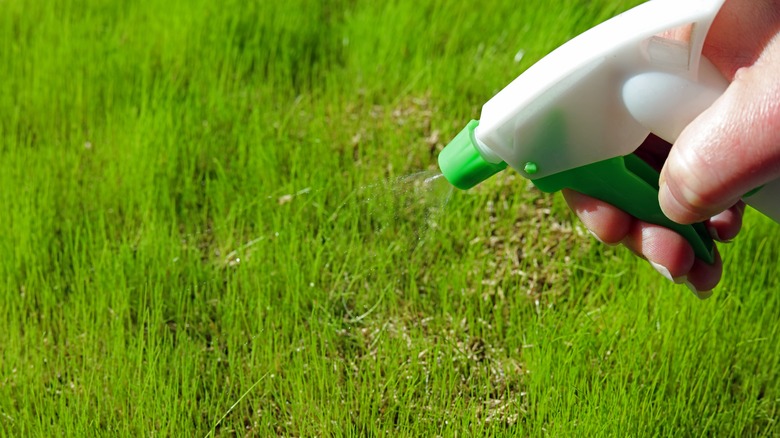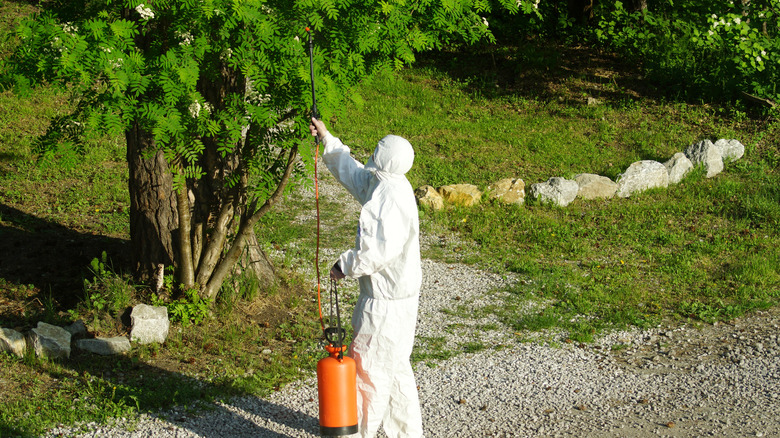Can Spraying Hydrogen Peroxide On Your Lawn Really Kill & Prevent Fleas?
TikTok can be full of ingenius hacks to try around the home and garden — but not all of them are winners. This hydrogen peroxide trick to get rid of fleas naturally in your lawn is, unfortunately, probably one TikTok hack that won't actually work.
According to the video, simply spraying hydrogen peroxide on your lawn will stop fleas, ticks, gnats, and mosquitos from repopulating and prevent their eggs from hatching. Using a cleaning product that you probably already have in your kitchen or laundry room to eradicate four of the worst pests we deal with sounds great. However, the science doesn't really back up these claims. According to the EPA, hydrogen peroxide is currently only approved for use in agriculture as an antimicrobial treatment on crops. So, it's used to kill harmful disease-causing bacteria and fungi, but not bugs.
Even though there aren't any hydrogen peroxide-based insecticides, there is some evidence that hydrogen peroxide can kill insects and their eggs — but the methods that worked aren't ones you can practically do at home. While common household hydrogen peroxide is unlikely to cause any damage to your lawn, it's also unlikely to eradicate fleas and other pests.
Hydrogen peroxide works, but not the way TikTok claims
There are studies on whether hydrogen peroxide in various concentrations and formulas can kill insects, with most focusing on mosquitoes, fungus gnats, fruit flies, and other common pests. In general, those studies did find that hydrogen peroxide could effectively kill insect eggs and larvae — and, in some cases, adult insects, too.
The catch? Most only achieved those results by using methods like immersion or fumigation. For example, a study in Frontiers in Bioengineering and Biotechnology found that hydrogen peroxide gas did kill mosquitoes and other pests, but only at high concentrations and after several hours of exposure. Fumigating your lawn is expensive, potentially hazardous, and requires a trained professional to do it right. It's not exactly the quick and easy flea-killing hack TikTok promises.
Another study from the Research Journal of Parasitology showed that hydrogen peroxide effectively killed roundworm eggs. But, in this case, the eggs were immersed in the solution for 24 hours — again, not something you can easily replicate at home. While some sources suggest spraying diluted hydrogen peroxide can kill insects on contact, spraying won't penetrate the soil surface to reach the eggs buried below. So, at best, you'll be dealing with another wave of pests once those protected eggs hatch.
Alternative flea control options that work
Spraying your lawn with hydrogen peroxide might not get you the results you were hoping for, but there are ways to prevent fleas and other pests in your yard. To start, if you're currently dealing with a bad flea infestation, you might need to resort to a one-time application of insecticide to get it under control. If you are treating your yard for fleas, check the label on the insecticide to ensure you pick one that lists fleas as a target species. Then, focus on the areas where fleas are likely to be: shady, protected areas under trees and shrubs, porches, or in crawl spaces. Finally, make sure to follow the directions on the package, including recommended follow-up treatments to kill newly hatched eggs.
After that, you can focus on prevention methods to keep them from re-infesting your yard. According to the CDC, the best way to do that is to avoid overwatering and mow frequently. This will make your lawn less humid and more exposed to the sun, two things fleas don't like. If the fleas are being brought in by stray or wild animals, building a simple fence can keep your lawn flea-free by keeping out the critters that carry them. If building a fence isn't an option, try making your yard less appealing to animals by sealing your trash cans and removing any outdoor pet food dishes.

